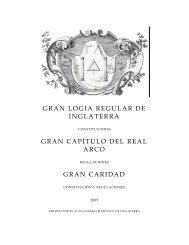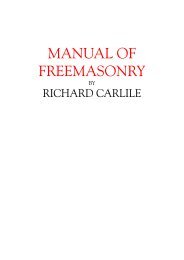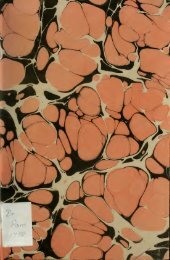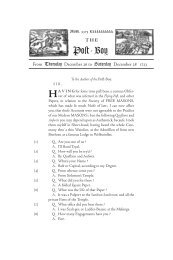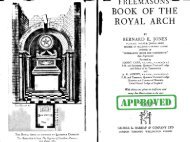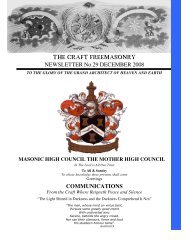THE CRAFT FREEMASONRY - Masonic High Council the Mother ...
THE CRAFT FREEMASONRY - Masonic High Council the Mother ...
THE CRAFT FREEMASONRY - Masonic High Council the Mother ...
Create successful ePaper yourself
Turn your PDF publications into a flip-book with our unique Google optimized e-Paper software.
Good Brethren and Fellows, our purpose is to tell you how and in what manner this worthy Craft of<br />
Masonry was first begun, and afterwards how it was mentioned and cherished by Kings and Princes<br />
and many o<strong>the</strong>r worshipful men; and to those that are here we shall declare <strong>the</strong> charges that every<br />
Freemason should keep. For <strong>the</strong> science of Masonry is a virtuous Craft, and well worthy to be kept,<br />
being one of <strong>the</strong> seven liberal arts and sciences, which are as follow.<br />
1 - The first is Grammar, which teaches man to speak and write correctly.<br />
2 - The second is Rhetoric, which teaches man to speak in subtle terms.<br />
3- The third is Logic, which teaches man to discern truth from falsehood.<br />
4 - The fourth is Arithmetic, which teaches man to reckon and count all numbers.<br />
5 - The fifth is Geometry, which teaches man to mete and measure <strong>the</strong> earth and all manner of things<br />
and Masonry is of this science.<br />
6 - The sixth is Music, which teaches man <strong>the</strong> craft of song and sweet sounds.<br />
7 - The seventh is Astronomy, which teaches man to know <strong>the</strong> course of <strong>the</strong> sun, moon and stars.<br />
Thus it may be proved that all <strong>the</strong> sciences of <strong>the</strong> world are grounded on <strong>the</strong> science of Geometry, for<br />
<strong>the</strong>re is no trade or craft which does not work by mete or measure, nor does man buy or sell anything<br />
except by weight or measure, and especially do ploughmen and tillers of <strong>the</strong> soil work by <strong>the</strong> science of<br />
Geometry. None of <strong>the</strong> o<strong>the</strong>r sciences can enable man to carry on his trade or craft in such a way,<br />
wherefore we argue that Geometry is <strong>the</strong> worthiest of all sciences.<br />
We shall now tell you how this science was begun. According to <strong>the</strong> fourth chapter of Genesis, before<br />
Noah's flood, <strong>the</strong>re was a man called Lamech who had two wives, one called Ada and <strong>the</strong> o<strong>the</strong>r Zillah.<br />
The first wife Ada bore him two sons, Jabal and Jubal, and <strong>the</strong> second wife Zillah bore him a son and a<br />
daughter, tubal-Cain and Naamah. These four children found <strong>the</strong> beginning of all <strong>the</strong> crafts in <strong>the</strong><br />
world. Jabel, <strong>the</strong> eldest son, found <strong>the</strong> craft of Geometry, and he was <strong>the</strong> first person to divide lands<br />
and flocks of sheep and lambs, and he was also <strong>the</strong> first to build a house of wood and stone. Jubal<br />
found <strong>the</strong> craft of Music, Tubal-Cain <strong>the</strong> craft of <strong>the</strong> Smith and Naamah <strong>the</strong> craft of Weaving. Now<br />
<strong>the</strong>se children knew that God would take vengeance upon <strong>the</strong> earth, ei<strong>the</strong>r by fire or water, and in<br />
order that <strong>the</strong>ir discoveries might be preserved to future generations <strong>the</strong>y wrote <strong>the</strong>m upon two pillars<br />
of stone; on of marble, which would not burn in fire, and <strong>the</strong> o<strong>the</strong>r of lattress, which would not drown<br />
in water. After <strong>the</strong> destruction of <strong>the</strong> world by flood, Hermes, who has been called <strong>the</strong> Fa<strong>the</strong>r of Wise<br />
Men, found one of <strong>the</strong> pillars and taught <strong>the</strong> sciences written <strong>the</strong>reon to o<strong>the</strong>r men.<br />
At <strong>the</strong> building of <strong>the</strong> Tower of Babel, masonry was in great repute, and Nimrod, <strong>the</strong> King of Babylon,<br />
was himself a Mason and a lover of <strong>the</strong> craft, so that when Nineveh and o<strong>the</strong>r cities of <strong>the</strong> East were<br />
about to be built, he sent thi<strong>the</strong>r three score masons at <strong>the</strong> request of his cousin, <strong>the</strong> King of Nineveh,<br />
and when <strong>the</strong>y went forth he gave <strong>the</strong>m a Charge in this manner: That <strong>the</strong>y should love each o<strong>the</strong>r<br />
truly, in order that no discredit should fall on him for sending <strong>the</strong>m, and he also gave <strong>the</strong>m a charge<br />
concerning <strong>the</strong>ir science. These were <strong>the</strong> first Masons who ever received any charge. At a later date<br />
when Abraham, with his wife Sarah, went into Egypt he taught <strong>the</strong> seven sciences to <strong>the</strong> Egyptians,<br />
and he had a worthy scholar called Euclid, who made profitable use of his instructions. In <strong>the</strong>se times it<br />
happen ed that many Lords and o<strong>the</strong>r great men of <strong>the</strong> realm had so many sons, some by <strong>the</strong>ir wives<br />
and some by o<strong>the</strong>r ladies, for that is a hot country and plenteous of generation, that <strong>the</strong>y had not<br />
sufficient means to maintain <strong>the</strong>m.<br />
So <strong>the</strong> King of <strong>the</strong> Country called a <strong>Council</strong> toge<strong>the</strong>r and caused a parliament to be held to ascertain if<br />
any scheme could be devised to remove <strong>the</strong> difficulty. After full consideration <strong>the</strong>y issued a<br />
proclamation that if anyone could inform <strong>the</strong>m of any cunning art or science which would be of any<br />
avail he should be richly rewarded. Euclid, <strong>the</strong>refore, came before <strong>the</strong> King and his <strong>Council</strong> and offered,<br />
on condition of being appointed by commission to rule over <strong>the</strong>m, to teach <strong>the</strong>ir sons <strong>the</strong> seven liberal<br />
sciences. The commission having been granted, Euclid took <strong>the</strong>se Nobles' sons and instructed <strong>the</strong>m in<br />
<strong>the</strong> science of Geometry and how to apply <strong>the</strong> knowledge to all manner of worthy works, such as <strong>the</strong><br />
building of castles, churches, manors, towns and houses, and he gave <strong>the</strong>m Charges similar to those<br />
which Nimrod had given in Babylon, with <strong>the</strong> addition of o<strong>the</strong>rs which would take us too long to<br />
describe; and he made <strong>the</strong>m swear a great oath, which men used at that time and gave <strong>the</strong>m<br />
reasonable wages that <strong>the</strong>y might live honestly. And he also arranged that <strong>the</strong>y should assemble<br />
19



